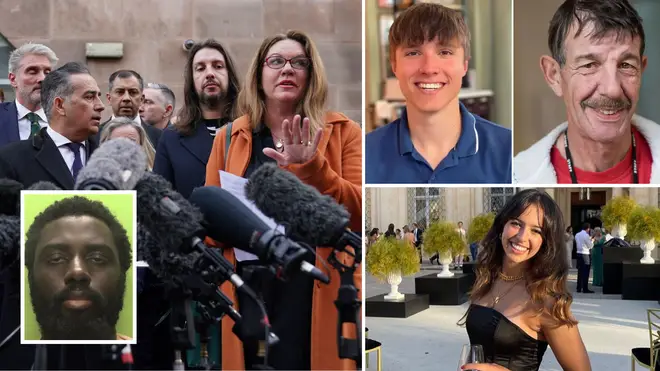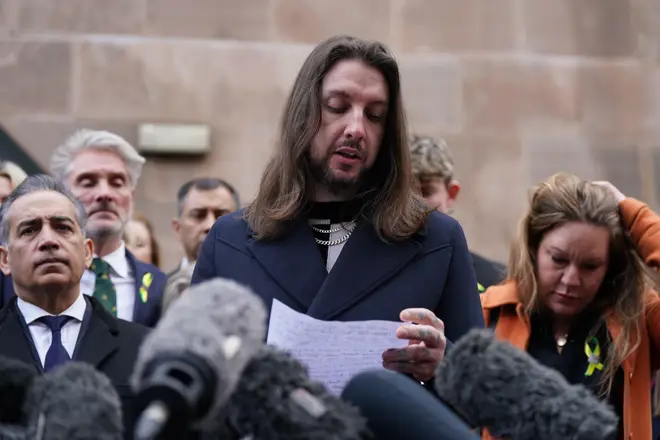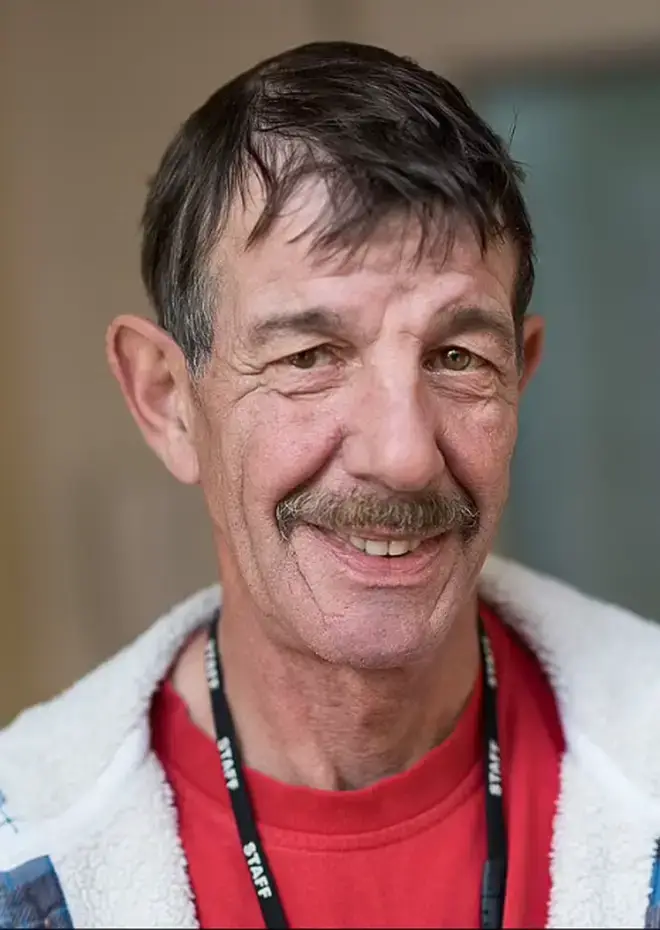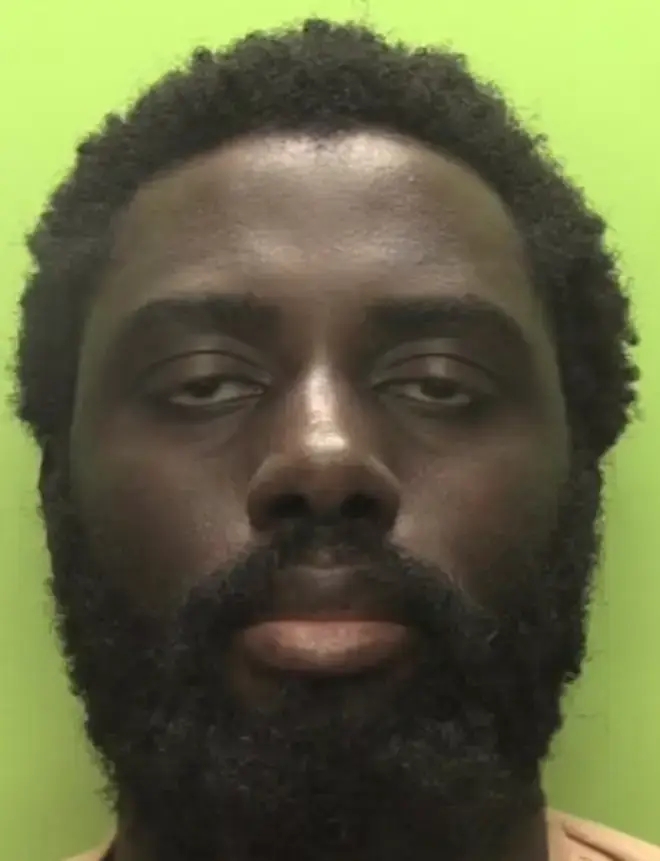
Ian Payne 4am - 7am
26 January 2024, 00:11 | Updated: 26 January 2024, 00:17

The sentence of Nottingham killer Valdo Calocane will be reviewed by the Attorney General after the families of his victims claimed he "got away with murder".
Calocane, 32, killed 19-year-old university students Barnaby Webber and Grace O'Malley-Kumar in Nottingham on June 13 last year.
He killed 65-year-old Ian Coates, 65, later in the morning, before trying to kill three more people by smashing the school caretaker's van into them.
Calocane, who experiences paranoid schizophrenia, was handed an indefinite order and will be detained in a high security hospital "probably for the rest of his life" after he pleaded guilty to manslaughter on the basis of diminished responsibility.
The killer was originally charged with murder but his charge was later downgraded to manslaughter due to his schizophrenia.
Nonetheless, the families of the victims have heavily criticised the Crown Prosecution Service, claiming they were "railroaded" into accepting the manslaughter plea.
Following a complaint that his sentence was too lenient, Victoria Prentis, the Attorney General, will review the case and could send it to the Court of Appeal for judges to decide whether an indefinite order is appropriate, The Telegraph reports.

Judge sentences Valdo Calocane hospital order
Speaking after Calocane was sentenced to an indefinite order, Mr Coates' son James said that the killer had "made a mockery of the system", adding that "he has got away with murder".
The bereaved son said: "This man is a killer - murder was the only thing he cared about."
Barnaby's mother Emma Webber said after the trial that "true justice has not been served today".
She said on the court steps: "We as a devastated family have been let down by multiple agency failings and ineffectiveness. "The CPS (Crown Prosecution Service) did not consult us as has been reported - instead we have been rushed, hastened and railroaded."
Ms Webber added: "We were presented with a fait accompli that the decision had been made to accept manslaughter charges.


"At no point during the previous five-and-a-half-months were we given any indication that this could conclude in anything other than murder.
"We trusted in our system, foolishly as it turns out.
"We do not dispute that the murderer is mentally unwell and has been for a number of years.
"However the pre-mediated planning, the collection of lethal weapons, hiding in the shadows and brutality of the attacks are that of an individual who knew exactly what he was doing. He knew entirely that it was wrong but he did it anyway."
One psychiatrist, who assessed Calocane ahead of the sentencing, said he was "divorced from reality" while another said he was not "insane" at the time of the attacks but his rational judgement and self control was heavily affected.

Nottinghamshire Police earlier admitted that they "should have done more" to stop Calocane, having been in contact with the killer "on a number of occasions between 2020 and 2022".
They also had a warrant out for Calocane's arrest for nine months at the time of the killing, after he assaulted a police officer.
The families also hit out at the force for their "failures" on the case.
Ms Webber told the assistant chief constable that he had "blood on [his] hands", while Mr Coates said that "NHS mental health trusts have to be held accountable for their failures, along with the police".
Grace's father Sanjoy said that he and his family would "look for answers regarding missed opportunities to intervene and prevent this heinous crime."

At sentencing, Calocane was told by the judge, Mr Justice Turner,: "Your sickening crimes both shocked the nation and wrecked the lives of your surviving victims and the families of them all."
The judge told Calocane: "But for the voices inside your head ... you had no reason to harm any of them. You still labour under the strong impression that the voices are real.
"You were and remain dangerous."
He added that putting him in jail would risk him rejecting medication.

Barnaby was attacked by Calocane just down the road from his student residence.
During Calocane's sentencing hearing, Barnaby's father David told him: "Your despicable, murderous actions are not reparable in this or any other lifetime.
"Your evil, vicious, selfish, unforgivable actions have caused damage that will never be repaired."
He added: "Barnaby was a vibrant, loving boy who was growing into a man and starting to live his best life.
"As a father I dreaded him leaving home (to go to university) but I loved my visits to see him; he always had a smile to welcome me.
"Due to your unbelievably savage actions I will never get that again."

Grace, a medicine student, tried to intervene and push him away and has since been called a hero for trying to save her friend. The judge said she would have been an exemplary practitioner had her life not been cut short.
Her brother James, 17, said: "Grace's last moments were in pain and that's something that really hurts me to think about and she was a hero, that was her character.
"She tried her best to save her friend. That was how Grace lost her life in the most vulnerable manner.
"She would never leave a friend, never, and that was very evident from her last moments. She passed fighting."
Calocane, who wielded a double edged fighting knife, attacked her and she fell next to Barnaby. Calocane went back to attack him before calmly walking off.

The attack was caught on a taxi's dashcam.
"That footage shows that the devastating violence of the attacks was mirrored only by the deliberate and merciless way the defendant acted," prosecutor Karim Khalil said previously.
He was then seeing trying to get into a homeless hostel to attack those inside but he was fought off by an occupant.
He later attacked Mr Coates, stabbing him to death, then took his van to search for more victims.
Calocane swerved to hit Wayne Birkett, a random pedestrian who suffered life-changing injuries, including brain damage that leaves even basic tasks and his personality has changed, having lost interest in his social life and football.
He lives in constant pain and believes it would have been better for all if he had died.

The killer then drove at two other pedestrians, Marcin Gawronski and Sharon Miller, who were "extremely lucky to survive". Ms Miller is still worried about going out.
After being boxed in by the police, he pulled out his knife and only dropped it when officers Tasered him.
The judge said Calocane had sentenced the victims' families to a lifetime of "grief and pain".
He said the killer was "clearly an intelligent man" who studied mechanical engineering at Nottingham University but he later developed mental health issues, feeling his flatmates and intelligence services were spying on him.
He heard voices he believed were controlling him and he went to MI5 in the belief they could stop them.

Nottinghamshire police break down Valdo Calocane's attack
He stopped taking his medication, believing the voices were real, and tried to break into other flats. He attacked an officer when he was set to undergo a mental health assessment.
Calocane also attacked employees during a warehouse job during a time when he seemed to improve, for which he was sacked.
He held no relevant political, religious or ideological convictions.
He still believes the voices are real and does not think he is mentally ill, the judge said.
The Crown Prosecution Service's Janine McKinney said: "These were savage, ferocious attacks against entirely innocent people who had no way of defending themselves.
"His pleas to manslaughter were only accepted after very careful analysis of the evidence.
"We reached this conclusion because the expert medical evidence was overwhelming; namely that his actions were substantially impaired by psychosis resulting from paranoid schizophrenia."